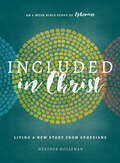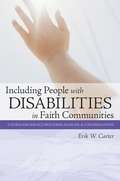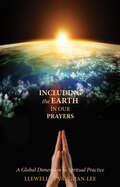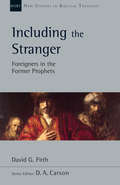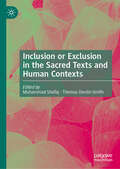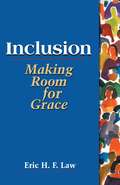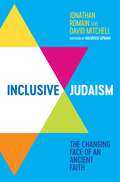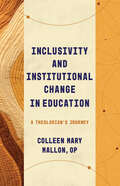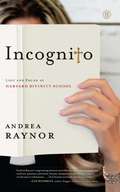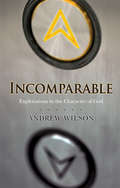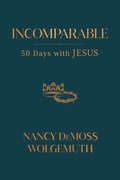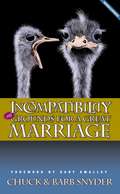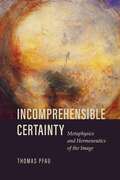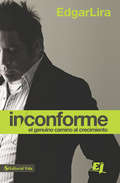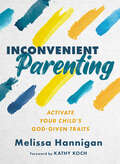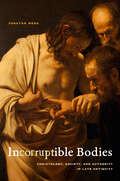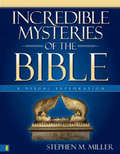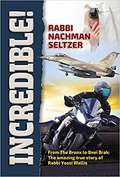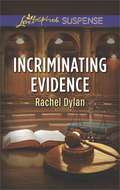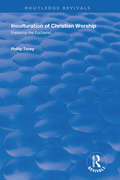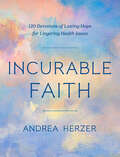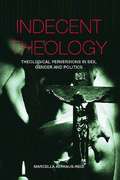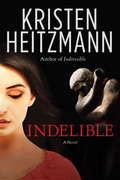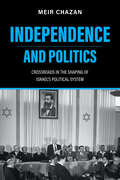- Table View
- List View
Included in Christ: Living A New Story from Ephesians (A Bible Study)
by Heather HollemanA new kind of Bible study…After the success of her first two books, Heather Holleman received many requests to write a Bible study. And as a college English instructor, she wanted to make sure it really taught and didn&’t simply inform. So she surveyed several women about what their dream study would look like, then got to work. The result is Included in Christ, a narrative-driven study where you can bring your life before Scripture in the context of community. Together women will discern their personal shadow narratives—ways they are living outside of their identity in Christ—and then rewrite those narratives according to biblical truth.This in-depth, 8-week study in Ephesians willequip women with six &“signature stories&” of God&’s work in their lives—helping them combat exclusion, loneliness, weakness, decay, emptiness, and silence. Designed to facilitate honest sharing and help you internalize biblical truth, Included in Christ will provide community and connectedness as well as spiritual nourishment. It will also guide you in how to share your story and the hope of Christ with someone who doesn&’t yet know Him.
Included in Christ: Living A New Story from Ephesians (A Bible Study)
by Heather HollemanA new kind of Bible study…After the success of her first two books, Heather Holleman received many requests to write a Bible study. And as a college English instructor, she wanted to make sure it really taught and didn&’t simply inform. So she surveyed several women about what their dream study would look like, then got to work. The result is Included in Christ, a narrative-driven study where you can bring your life before Scripture in the context of community. Together women will discern their personal shadow narratives—ways they are living outside of their identity in Christ—and then rewrite those narratives according to biblical truth.This in-depth, 8-week study in Ephesians willequip women with six &“signature stories&” of God&’s work in their lives—helping them combat exclusion, loneliness, weakness, decay, emptiness, and silence. Designed to facilitate honest sharing and help you internalize biblical truth, Included in Christ will provide community and connectedness as well as spiritual nourishment. It will also guide you in how to share your story and the hope of Christ with someone who doesn&’t yet know Him.
Including People With Disabilities in Faith Communities: A Guide for Service Providers, Families, and Congregations
by Erik W. CarterA congregational community is an ideal place to share and strengthen faith, form lasting relationships, and develop special gifts and talents. Too often, though, people with developmental and other disabilities lack the opportunities and supports to fully participate in the life of their faith community. That's why families and service providers need to read this groundbreaking guidebook--and share a copy with congregations that want to become places of welcome and belonging for people with disabilities. Bringing his practical ideas to life with anecdotes, quotes, and examples of successful strategies, Erik Carter helps readers reflect on how welcoming their congregation is--and could be--for people with disabilities and their families articulate and pursue a bold vision of inclusion throughout their congregation, community, city, or state take steps to break down attitudinal, architectural, programmatic, and other barriers to inclusion design appropriate, inclusive religious education programs for children, youth, and adults learn how service providers can actively support the spiritual preferences, strengths, and needs of people with disabilities To make inclusion work in any faith community, this how-to book gives readers workable strategies and photocopiable forms for identifying indicators of welcome; encouraging community outreach, and gathering important information about the support needs of people with disabilities and their families.
Including the Earth in Our Prayers: A Global Dimension to Spiritual Practice
by Llewellyn Vaughan-LeeIncluding the Earth in Our Prayers tells a story of love and prayer, how spiritual practice is not just for ourselves, our own journey, but for life itself. It steps back to reclaim the wisdom of our ancestors, including the "Original Instructions" of Indigenous peoples—how we need to "get along" with all of creation—and relates these teachings to the need of our present time. With our ecosystem in crisis and our culture increasingly divisive, it suggests ways in which the energy and transformative potential of our spiritual nature can be applied to these critical issues, and reconnects us with a spiritual understanding of the living Earth. The simple premise of this book is that there is a vital need to shift our collective culture from a story of separation and exploitation into a new story of living oneness, and that spiritual practice, and the love and light it generates, have an essential part to play in this shift.
Including the Stranger: Foreigners in the Former Prophets (New Studies in Biblical Theology #Volume 50)
by David G. FirthThe Old Testament, particularly the Former Prophets (Joshua, Judges, 1-2 Samuel, and 1-2 Kings), has frequently been regarded as having a negative attitude towards foreigners. This has meant that these texts are often employed by those opposed to the Christian faith to attack the Bible—and such views can be echoed by Christians. While the story of David and Goliath is cherished, other episodes are seen to involve "ethnic cleansing" or "massacre" and are avoided. David Firth's contention is that this approach emerges from an established interpretation of the text, but not the text itself. In this New Studies in Biblical Theology volume, he argues that the Former Prophets subvert the exclusivist approach in order to show that the people of God are not defined by ethnicity but rather by their willingness to commit themselves to the purposes of Yahweh. God's purposes are always wider than Israel alone, and Israel must therefore understand themselves as a people who welcome and include the foreigner. Firth addresses contemporary concerns about the ongoing significance of the Old Testament for Christians, and shows how opponents of Christianity have misunderstood the Bible. His reading of the Former Prophets also has significant ethical implications for Christians today as they wrestle with the issues of migration and what it means to be the people of God. Addressing key issues in biblical theology, the works comprising New Studies in Biblical Theology are creative attempts to help Christians better understand their Bibles. The NSBT series is edited by D. A. Carson, aiming to simultaneously instruct and to edify, to interact with current scholarship and to point the way ahead.
Inclusion or Exclusion in the Sacred Texts and Human Contexts
by Muhammad Shafiq Thomas Donlin-SmithThis work delves into the fundamental issue of Otherness, from both sacred texts and communal experiences. While the title adopts the dyad of “inclusion” or “exclusion”, these analyses broadly reflect nuanced critical considerations. Filled with profound psychological, theological, sociological, anthropological, and ethical dimensions, experiencing the Other is richly expressed within religious traditions. This book is a must for scholars interested in a multi-disciplinary approach to inclusivity and religion.
Inclusion: Making Room For Grace
by Eric H. F. LawIn this resource for ministers and church leaders, Law provides models, theories, and strategies that are both practical and theologically sound for moving faith communities toward greater inclusion.
Inclusive Judaism: The Changing Face of an Ancient Faith
by David Mitchell Jonathan RomainOne of the best-kept religious secrets has been the revolution that has been quietly taking place within Judaism over the last two decades, as it has sought to grapple with contemporary issues. These include mixed-faith marriages, gay relationships, women's empowerment, declining numbers, atheism and being trans. It has involved a willingness to abandon biblical laws that conflict with modern values. Most ground-breaking of all, it has meant re-defining what it means to be Jewish in the 21st century.Inclusive Judaism not only uncovers this religion revolution, but presents a challenge to all people of faith on how best to marry tradition and modernity. The book also reflects the soul-searching that has prompted rabbis to chart a new course, both out of principle and as a practical way of rescuing British Jewry from possible collapse if it did not adapt to the new social trends that affect us all.
Inclusivity and Institutional Change in Education: A Theologian's Journey (Theological Education between the Times (TEBT))
by Colleen Mary MallonDo you want to implement diversity, equity, and inclusion initiatives at your institution, but you don&’t know where to start? In the wake of the murder of George Floyd, a small Catholic secondary school erupted in controversy. Students and alumni took to social media to share stories of their own experiences with racism on campus. It was clear that the school&’s culture needed to change. Enter Sr. Colleen Mary Mallon, who joined the high school as the director of mission formation. Pursuing grassroots institutional reform, Sr. Colleen found a new meaning of theological education. In this candid volume, Sr. Colleen reflects on the challenges of molding her Dominican school to embody its charism of veritas. This commitment to truth required her school and her Dominican sisters to recognize their complicity in white supremacy and to center the concerns of marginalized communities. Educating faculty, staff, administrators, and parents in Catholic Social Teaching equipped them to bring their actions—and the culture of the school—into alignment with their professed values. Sr. Colleen&’s story offers one example of how schools can implement antiracist and antibias reforms. With its wealth of practical insights and discussion questions, Inclusivity and Institutional Change in Education will guide readers in effecting cultural change in their own institutions.
Incognito: Lost and Found at Harvard Divinity School
by Andrea RaynorFilled with humor, insight, and faith, this true story tells how one woman overcame challenges, stereotypes, and personal struggles at Harvard Divinity School and emerged an ordained minister. As a bright young girl from Ohio, Andrea Raynor always wanted to be a doctor. Instead, she landed-- almost by accident--at Harvard Divinity School, which, she quickly discovered, was no typical seminary. When she attended, in the 1980s, HDS was a place overflowing with creative expression and freedom of thought. Her classmates included two men who were undergoing sex changes and a woman who fancied herself a geisha. There was a lively gay and lesbian caucus, marches on Washington, civil disobedience, and more sexual intrigue than could be found in a stereotypical college fraternity house. Providing a bird's-eye view of life within the hallowed halls (and beneath the crimson robes), Incognito is a humorous and poignant glimpse inside one of the nation's most revered institutions. It begins with the long drive from Ohio to Cambridge and ends at the bedside of a dying young woman. But the real story is about the challenges, surprises, and ultimately life-changing experiences Andrea faced on the road to understanding God's call for her life. From navigating relationships to exploring whether a pretty girl can truly wear a collar, Incognito tackles our assumptions about spirituality, the church, morality, and identity, and affirms that God often works in ways--and in people--we least expect.
Incomparable
by Andrew WilsonThere is no greater pursuit, no greater journey, and no greater joy than discovering the extraordinary character of God.Incomparable explores sixty names and descriptions of our creator. Each chapter is filled with profound Biblical insights and revelations that will inspire and enrich your faith. Selah moments allow for a time of reflection and worship. And practical applications connect each truth with your daily life. Throughout, Incomparable unfolds the greatest wonder our minds and hearts will ever contemplate.Immerse yourself in His character. Delve into the depths of His presence. And experience a God that is truly beyond compare.
Incomparable: 50 Days with Jesus
by Nancy DeMoss WolgemuthWhatever you think about Jesus, He is more.Incomparably more. Get to know this Jesus by joining beloved author and Bible teacher Nancy DeMoss Wolgemuth on a fifty-day journey, inspired by J. Oswald Sanders&’ classic volume, The Incomparable Christ, to explore His one-of-a-kind story. From heaven to earth. From birth to death. From resurrection to right this minute. From before time to all time. In these meditations, you&’ll spend time reflecting on the person of Christ—His humanity, divinity, childhood, adulthood, and more. You&’ll consider the work and words of Christ. And you&’ll contemplate His preexistence, prayer life, majestic silence, anguish, atoning work, post-resurrection ministry, and promised second coming. Find in Jesus—fully God and fully Man—everything you will ever need. He alone is able to save you to the end and understands you to the core. Able to forgive and befriend you, challenge and change you. This book can be used at any time of the year but serves as an ideal devotional companion for the season leading up to and immediately following Easter. As you walk through these days, you will be reminded that there is no one else like Jesus. He is quite simply . . . Incomparable.
Incompatibility: Still Grounds for a Great Marriage
by Barb Snyder Chuck SnyderDo women really spend more time in the bathroom? Are men truly more gifted when it comes to handling the remote control? Will women ever understand the intense concentration demanded by Monday Night Football? Chuck and Barb Snyder (who reveal that their only area of compatibility is having the same kids and grandkids) tackle these and other questions in Incompatibility: (Still) Grounds for a Great Marriage, an entertaining, insightful, and sensible primer on marriage for Christian couples. Ten years after their popular original book, they've teamed up again to present new material and elaborate on their original themes. Readers will learn that differences between couples are actually part of God's plan for marriage and should be viewed as assets, not liabilities.From the Trade Paperback edition.
Incomprehensible Certainty: Metaphysics and Hermeneutics of the Image
by Thomas PfauThomas Pfau’s study of images and visual experience is a tour de force linking Platonic metaphysics to modern phenomenology and probing literary, philosophical, and theological accounts of visual experience from Plato to Rilke. <p><p> Incomprehensible Certainty presents a sustained reflection on the nature of images and the phenomenology of visual experience. Taking the “image” (eikōn) as the essential medium of art and literature and as foundational for the intuitive ways in which we make contact with our “lifeworld,” Thomas Pfau draws in equal measure on Platonic metaphysics and modern phenomenology to advance a series of interlocking claims. <p><p>First, Pfau shows that, beginning with Plato’s later dialogues, being and appearance came to be understood as ontologically distinct from (but no longer opposed to) one another. Second, in contrast to the idol that is typically gazed at and visually consumed as an object of desire, this study positions the image as a medium whose intrinsic abundance and excess reveal to us its metaphysical function―namely, as the visible analogue of an invisible, numinous reality. Finally, the interpretations unfolded in this book (from Plato, Plotinus, Pseudo-Dionysius, John Damascene via Bernard of Clairvaux, Bonaventure, Julian of Norwich, and Nicholas of Cusa to modern writers and artists such as Goethe, Ruskin, Turner, Hopkins, Cézanne, and Rilke) affirm the essential complementarity of image and word, visual intuition and hermeneutic practice, in theology, philosophy, and literature. <p><p>Like Pfau’s previous book, Minding the Modern, Incomprehensible Certainty is a major work. With over fifty illustrations, the book will interest students and scholars of philosophy, theology, literature, and art history.
Inconforme
by Edgar Lira¿Por qué el domingo? ¿Por qué la corbata? ¿Por qué las más de dos horas de reunión (a veces cuatro)? ¿Por qué el estilo de hablar de Reina Valera si no soy Español? ¿Por qué la música tan irrelevante? ¿Por qué esta manera de hacer iglesia? ¿Por qué tiene que ser así? ¿Por qué no seguir la corriente y evitarse la molestia? ¿Por qué pienso estas cosas? ¿Por qué me incomodan? ¿Por qué? Si has hecho una o más de estas preguntas, entonces este será un libro que llegará a tus manos en el momento propicio. Edgar Lira te guiará a una aventura honesta, sin prejuicios e incomoda que elevará tu nivel de entendimiento del por qué hacemos lo que hacemos los cristianos. Al mismo tiempo, te sumergirás en una relación con práctica, relevante y transformadora con el Jesús de la Biblia. Este libro te ayudará a sanar las heridas del corazón y ser la iglesia que Dios siempre quiso.
Inconvenient Parenting: Activate Your Child's God-Given Traits
by Melissa HanniganHope and help for shaping Christ-honoring future generations.Families are like little churches. They are meant to be places of discipleship, worship, and rest—places where we can fine tune the gifts God&’s given us so we can bless the world. They can be full of surprises and joy. But family life can also be heartbreaking and downright discouraging. Trained counselor and mother Melissa Hannigan knows how hard it is to cast and keep a vision of rich family life. How do we cultivate a family culture that&’s vibrant and encouraging—a refuge amidst life&’s storms?Melissa is passionate about helping families build healthy, strong, God-honoring homes. In Inconvenient Parenting, she shares twelve qualities that are the key ingredients to that desired end:Wisdom — Wonder — Vitality — Sensitivity — Flexibility —Curiosity —Creativity — Imagination — Inventiveness — Playfulness — Humor — JoyMelissa shows us why, though inconvenient at times, it&’s necessary to encourage and infuse these traits in our children and reveals how we can unknowingly discourage these qualities. Each chapter concludes with practical activities, book recommendations, and discussion questions to help parents immediately apply the principles discussed.Become more connected to God and one another through the rich wisdom and help offered in Inconvenient Parenting.
Incorruptible Bodies: Christology, Society, and Authority in Late Antiquity (Christianity in Late Antiquity #1)
by Yonatan MossIn the early sixth-century eastern Roman empire, anti-Chalcedonian leaders Severus of Antioch and Julian of Halicarnassus debated the nature of Jesus's body: Was it corruptible prior to its resurrection from the dead? Viewing the controversy in light of late antiquity’s multiple images of the ‘body of Christ,’ Yonatan Moss reveals the underlying political, ritual, and cultural stakes and the long-lasting effects of this fateful theological debate. Incorruptible Bodies combines sophisticated historical methods with philological rigor and theological precision, bringing to light an important chapter in the history of Christianity.
Incredible Mysteries of the Bible: A Visual Exploration
by Stephen M. MillerWhere was the garden of Eden? What happened to the ark of the covenant? What is the unforgivable sin Jesus spoke of? If you’ve ever wondered about these or other questions while reading the Bible, then this is the book for you. Here is a fascinating look at some of the most perplexing mysteries found in the pages of the Bible. Drawing from the latest research in both archaeology and biblical studies, Incredible Mysteries of the Bible sheds fascinating and helpful light on fifty topics. Each article is accompanied by beautiful full-color images and helpful sidebars. Whether you read the book cover to cover or dip in and out at your leisure, you’ll gain a greater understanding of the world and message of the Bible. So grab your sleuthing hat and dig in!
Incredible!
by Rabbi Nachman SeltzerThis is a true story so full of non-stop action, physical and spiritual courage, Divine Providence, spine-tingling adventure -- and an utter dedication to Torah -- that it can only be called: Incredible!
Incriminating Evidence
by Rachel DylanFIGHTING FOR JUSTICE When rookie prosecutor Jessica Hughes crosses the son of a major crime boss, she's determined to bring him to justice-if his family doesn't kill her first. And with newly minted FBI special agent Zach Taylor protecting her, she believes she can succeed. Zach will do anything to stay ahead of the crime syndicate and guard Jessica while she builds her case. The more time he spends with her, the more personal the assignment becomes. It's bad timing for falling in love, but as the threats against her life escalate, Zach realizes Jessica is everything to him-and he will do everything he can to make sure she has a future.
Inculturation of Christian Worship: Exploring the Eucharist
by Phillip ToveyOriginally published in 2004. Inculturation - the creative and dynamic relationship between the Christian message and culture or cultures - is of interest to many churches throughout the world, particularly since the Second Vatican Council made it part of the Roman Catholic agenda. This book looks at the question of the inculturation of Christian worship, particularly in the Eucharist. Looking at the relationship of worship and culture requires insights from both theology and anthropology; Tovey develops the tools to interconnect perspectives into an interdisciplinary exploration of different models of inculturation. Inculturation of Christian Worship is both interdisciplinary and ecumenical in approach. Case studies are drawn from the Ethiopian Orthodox Church, African Independent Churches, The Roman Catholic Church and the Anglican Communion. While there is a focus on Africa for particular examples, the issues are discussed in a world wide context.
Incurable Faith: 120 Devotions of Lasting Hope for Lingering Health Issues
by Andrea HerzerDiscover the riches of abundant life that pain and illness can never take away in this encouraging devotional full of hard-won insights and powerful biblical inspiration.In Incurable Faith, Andrea Herzer writes from the midst of her own long-term illness to give you hope wherever you are on your journey with medical issues. Whether you are facing a new diagnosis, mysterious pain, or any other illness, you can go from being a victim to being victorious through God&’s sustaining love. Far from suggesting you must &“have faith and get over it,&” Andrea validates your suffering while offering sustaining hope for your soul. Through devotions, Scriptures, spiritual exercises, and suggested worship music, Incurable Faith helps you:• unlock the key to joy through praise, presence, and purpose• understand the difference between acceptance and resignation• nurture grace-filled relationships throughout the stresses of illness• navigate the isolation of being bedridden or homebound• develop practical strategies for coping with pain, fatigue, and anxietyThe 120 devotionals are grouped in varying lengths, so you can engage with shorter passages on days when concentration is difficult. Each devotion offers a Scripture verse, prayer, suggested worship song, and takeaway to keep your mind anchored in truth.A testament to how the joy of the Lord gives strength even when our bodies are weak, Incurable Faith invites you to know God&’s sustaining power and comfort in a deeper way—because no illness can diminish His abundant provision for you.Includes a topical Scripture index and multiple resources for caregivers.
Indecent Theology: Theological Perversions In Sex, Gender And Politics
by Marcella Althaus-ReidIndecent Theology brings liberation theology up to date by introducing the radical critical approaches of gender, postcolonial, and queer theory. Grounded in actual examples from Latin America, Marcella Althaus-Reid's highly provocative, but immaculately researched book reworks three distinct areas of theology - sexual, political and systematic. It exposes the connections between theology, sexuality and politics, whilst initiating a dramatic sexual rereading of systematic theology.Groundbreaking, intriguing and scholarly, Indecent Theology broadens the debate on sexuality and theology as never before.
Indelible: A Novel (Redford Series)
by Kristen HeitzmannIn a clash of light and darkness, can courage prevail? Rescuing a toddler from the jaws of a mountain lion, Trevor MacDaniel, a high-country outfi tter, sets in motion events he can't foresee. His act of bravery entwines his life with gifted sculptor Natalie Reeve--and attracts a grim admirer. Trevor's need to guard and protect is born of tragedy, prompting his decision to become a search and rescue volunteer. Natalie's gift of sculpting comes from an unusual disability that seeks release through her creative hands. In each other they see strength and courage as they face an incomprehensible foe. When a troubled soul views Trevor as archangel and adversary, Redford's peaceful mountain community is threatened. Together with Police Chief Jonah Westfall, Trevor presses his limits to combat the menace who targets the most helpless and innocent.From the Trade Paperback edition.
Independence and Politics: Crossroads in the Shaping of Israel's Political System (Perspectives on Israel Studies)
by Meir ChazanIndependence and Politics delves deeply into the political landscape of Israel during the years 1947–1949. Weaving together a wealth of original sources and emphasizing domestic politics, Meir Chazan offers a comprehensive analysis of the critical factors that contributed to the establishment and early governance of the State of Israel.Chazan explores the formation of governing institutions in the transition from a voluntary society to typical patterns of statehood. He investigates the shocks that led to these institutions' formation and the critical decision to declare statehood. Additionally, he provides a detailed account of the election campaign for the Constituent Assembly, which was the forerunner of the First Knesset, and the struggle to attain the United States' de facto and de jure recognition of Israel.Insightful and informative, Independence and Politics provides a fresh perspective on the establishment of the State of Israel. Chazan's analysis and expert commentary offer an unparalleled understanding of the challenges faced by the fledgling state and the decisions that shaped its future.
